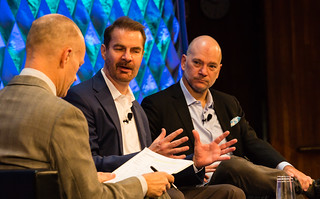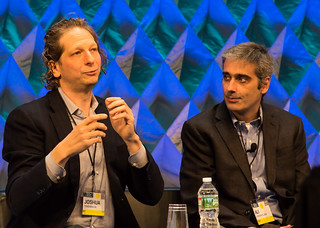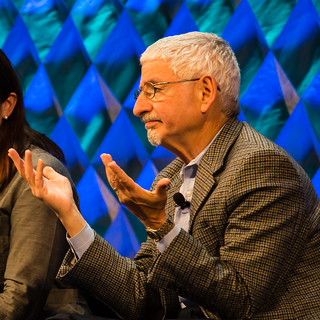I wrote earlier about the broad transformation themes at the MIT Sloan CIO Symposium last month. Today, I’m going to wrap up by taking a look at a few of the specific panels over the course of the day.
Artificial Intelligence
Andrew McAfee and Erik Brynjolfsson are regulars at this event. Their bestselling Second Machine Age focuses on the impact of automation and artificial intelligence on the future of work and technological, societal, and economic progress. Their new book Machine, Platform, Crowd: Harnessing Our Digital Future will be available later this month. Another panel, moderated by the MIT Media Lab’s Job Ito, featured discussions on the theme “Putting AI to Work.”
Like blockchain, which I’ll get to in a bit, a common thread seemed to be something along the lines of AI and machine learning being supremely important but with much still to do. In general, panelists avoided getting too specific about timelines. Ryan Gariepy, CTO & Co-Founder, Clearpath & OTTO Motors put the timing on the majority of truck driving jobs going away as a “generation.” My overall takeaway is that AI is probably be one of those things where many people are predicting greater short-term effects than is warranted while underestimating the effects over the longer term.
For example, Prof. Josh Tenenbaum, Professor, Department of Brain and Cognitive Sciences at MIT highlighted the difference between pattern recognition and modeling. He noted that "most of how children learn is not driven by pattern recognition” but it’s mostly pattern recognition where AI is having an impact on the market today. He went on to say that "other parts like common sense understanding we are quite far from. We’re quite a way from a conversation.The narrative that expert systems are a thing of the past is wrong. You can't build a system that beats the world's best Go players without thinking about Go. You can't build a self-driving car without driving."
Users of common “personal assistants” like Alexa have probably experienced something similar. Like a call center reading from a script, these assistants can recognize voices and act on simple command quite well. But get off script, especially in any way that requires an understanding of human behaviors, and their limitations quickly become clear.
McAfee also pointed to the confluence of AI with communications technology as a major factor driving rapid change. As he puts it “two huge things are happening simultaneously: the spurt of AI and machine learning systems and, it’s easy to forget about this, but over a decade have connected humanity for the first time. Put the two together and are in very very new territory."
As they do in their books, McAfee and Brynjolfsson also touched on the economic changes that these technological shifts could drive. For example, Brynjolfsson highlighted how “the underlying dynamics when you can produce things at near-zero marginal cost does tend to lead to winner takes all. The great decoupling of median wages is because a lot of the benefits have become much more concentrated."
Both suggested that government policy will eventually have to play a part. As McAfee put it "times of great change are not calm times. There’s a concentration of wealth and economic activity. Concentration has some nice benefits but it leaves a lot behind.” With respect to Universal Basic Income, however, McAfee added that "a check from the government doesn't magically knit communities back together. There's a role for smart policies and smart government."
Blockchain
The tone of the Trusted Data: The Role of Blockchain, Secure Identity, and Encryption panel was similar to that at Technology Review’s all-day blockchain event the prior month that I wrote about here. I’d sum it up in three bullets:
- It’s potentially very important
- Cryptocurrency existence proofs notwithstanding, as a foundational technology it’s still very early days
- Use cases and architectures are still fluid
Sandy Pentland, who moderated the panel, laid out some of the reasons why blockchain may be both useful and challenging. For example, he noted that "Data sharing is really difficult. You need to combine data from different sources that you may not own” On the other hand, "auditability is increasingly important. Are you being fair? You need to show decisions made. Existing architectures are just not up to it. Probably need consensus mechanisms like blockchain."
Hu Liang, Senior Managing Director Head of Emerging Technologies Center, State Street pointed out how some of the basic architectural elements of blockchain are still being debated. He went so far as to say that blockchain is just a fairly vague concept.” For example, he wondered whether "some things that made bitcoin popular may not be needed in an institutional world. Banks exist and regulators exist. Still get eencryption, auditability, but do you need proof of work?"
Finally Irving Wladawsky-Berger, Fellow, MIT Initiative on the Digital Economy (and long-time IBMer), framed blockchain as a transactional mechanism. He noted that "the internet never dealt with directly was transactions. Transactions are things that when they go wrong people get really really really upset. When transactions are part of interactions between different institutions it is a pain. The promise of blockchain over time is to be a record of transactions. benefits are gigantic.It could do for transactional systems what the internet does for connections."
But it will be a slow process. “The internet of the early to mid 90s was really crappy. The internet we are really happy with today took another 15 years to get there. We're at the toddlers stage. Foundational technologies take a long time."
----
Photos:
Top. Jason Pontin, Andrew McAfee, and Erik Brynjolfsson [Gordon Haff]
Prof. Josh Tenenbaum, Professor, Department of Brain and Cognitive Sciences, MIT [Gordon Haff]
Irving Wladawsky-Berger [Gordon Haff]




No comments:
Post a Comment